人教版高中英语必修三unit1复习学案 精品
英语人教版必修三第一单元总结复习导学案
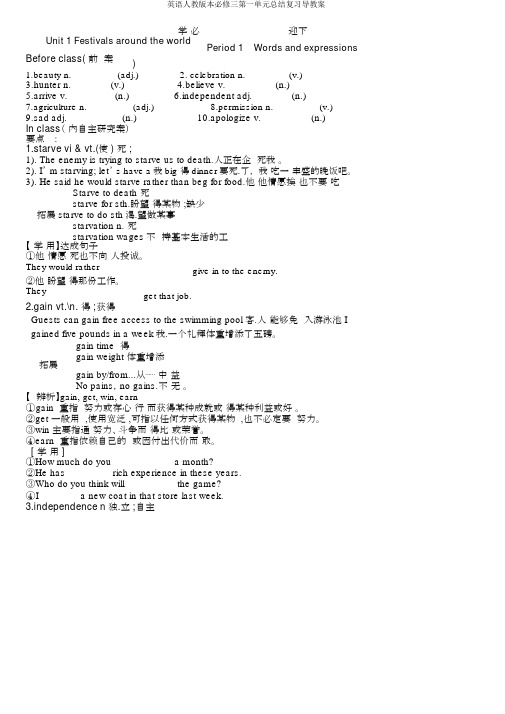
学必迎下Unit 1 Festivals around the worldPeriod 1 Words and expressions Before class(前案)1.beauty n._________(adj.) _______2. celebration n.________ (v.) __________3.hunter n._______ (v.) _________4.believe v._________ (n.) ___________5.arrive v._________(n.) _______6.independent adj._______ (n.) __________7.agriculture n._________(adj.) __________ 8.permission n._________(v.) ________ 9.sad adj.__________ (n.) ___________10.apologize v._________ (n.) _________ In class(内自主研究案)要点:1.starve vi & vt.(使 )死 ;1). The enemy is trying to starve us to death.人正在企死我。
2). I’ m starving; let’ s have a我big得dinner要死.了,我吃一丰盛的晚饭吧。
3). He said he would starve rather than beg for food.他他情愿挨也不要吃Starve to death死starve for sth.盼望得某物 ;缺少拓展starve to do sth渴.望做某事starvation n.死starvation wages不持基本生活的工【学用】达成句子①他情愿死也不向人投诚。
They would rather give in to the enemy.②他盼望得那份工作。
新课标人教版高中英语必修三 Unit1 精品学案(教师版)
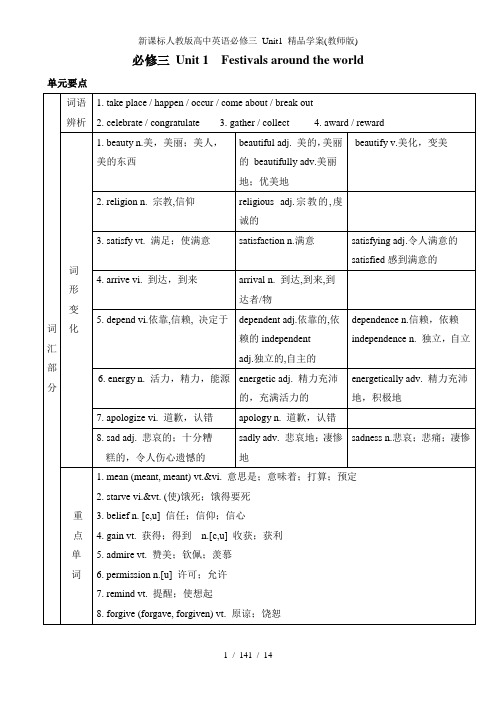
必修三Unit 1 Festivals around the world 单元要点一、根据句子的意思翻译或按要求填词。
1. take place / happen / occur / come about / break outtake place表示“发生、举行、举办”,一般指非偶然性事件“发生”,有某种原因或事先安排。
happen作“发生、碰巧”解,一般用于偶然或突发性事件。
occur作“发生、想到、突然想起”解,其意义相当于happen。
come about表示“发生、产生”,多指事情已经发生了,但还不知道为什么,常用于疑、否break out意思为“发生、爆发”,常指战争、灾难、疾病、火灾或者争吵等事件的发生1). Great changes have __taken place__ (发生) in our hometown during the past ten years.2). It occurred to me that (我突然想起) I saw him on my way home yesterday.3). I happened to see (碰巧看见) your sister crying on my way to school yesterday. I was in such ahurry that I had no time to ask what had happened to (介词) her?4). When the Second World War broke out (爆发), Tom was only a newborn infant.5). I’ ll never understand how it came about (发生) that you were late three times a week.2. celebrate / congratulatecelebrate“庆祝”,后面跟某个节日或物。
高一英语人教版必修三Unit1学案
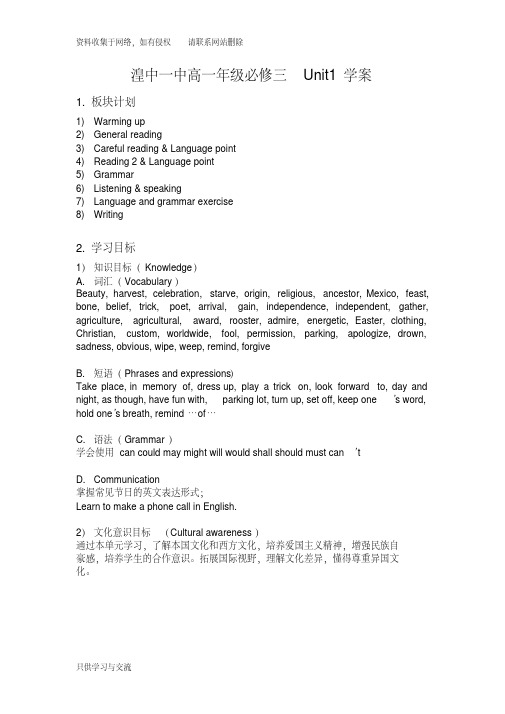
Dates Jan. 1st Mar. 8 th Apr. 5 th May 1 st May 4 th Jun. 1 st Sep. 10th Oct. 1 st The 1st day of the first
lunar month The 15th day of the first
lunar month The 5th day of the fifth
12. I tried aerobics ( 有氧运动 ) but it was too ________ for me.
13. He’ s deeply ________ and goes to church twice a week.
只供学习与交流
资料收集于网络,如有侵权 请联系网站删除
II. General Reading
2) Spring Festival words :
春节 农历 正月
过年 敬酒 红包 禁忌
the Spring Festival Lunar calendar lunar January, the first month by lunar calendar have the Spring Festival propose a toast red packets, lucky money taboo
资料收集于网络,如有侵权 请联系网站删除
2. 课前小组讨论(使用上页词汇进行一问一答练习)
Question What is the festival called? When is it celebrated? How is it celebrated? How is it celebrated? What is eaten? What are the stories about it?
高中英语必修三 Unit 1(学案+周练)
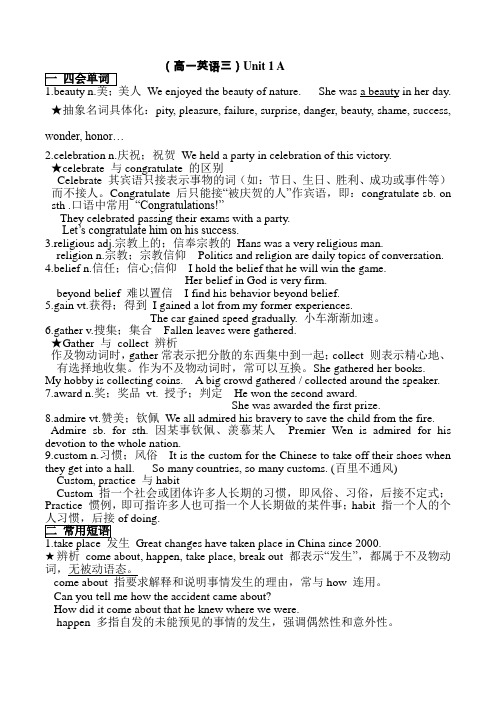
(高一英语三)Unit 1 AWe enjoyed the beauty of nature. She was a beauty in her day. ★抽象名词具体化:pity, pleasure, failure, surprise, danger, beauty, shame, success, wonder, honor…2.celebration n.庆祝;祝贺We held a party in celebration of this victory.★celebrate 与congratulate 的区别Celebrate 其宾语只接表示事物的词(如:节日、生日、胜利、成功或事件等)而不接人。
Congratulate 后只能接“被庆贺的人”作宾语,即:congratulate sb. on sth .口语中常用“Congratulations!”They celebrated passing their exams with a party.Let’s congratulate him on his success.3.religious adj.宗教上的;信奉宗教的Hans was a very religious man.religion n.宗教;宗教信仰Politics and religion are daily topics of conversation.4.belief n.信任;信心;信仰I hold the belief that he will win the game.Her belief in God is very firm.beyond belief 难以置信I find his behavior beyond belief.5.gain vt.获得;得到I gained a lot from my former experiences.The car gained speed gradually. 小车渐渐加速。
2020年人教版高中必修三英语Unit1语法复习学案设计
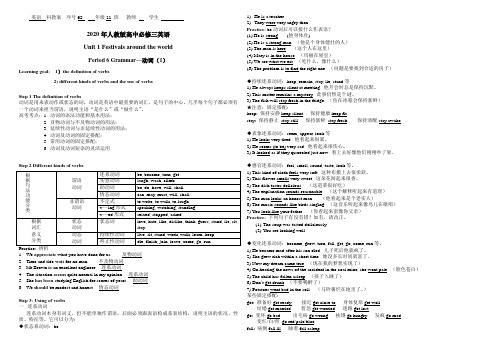
英语科教案序号62 年级11 班教师学生2020年人教版高中必修三英语Unit 1 Festivals around the worldPeriod 6 Grammar—动词(1)Learning goal: 1)the definition of verbs2) different kinds of verbs and the use of verbsStep 1 The definition of verbs动词是用来表动作或状态的词,动词是英语中最重要的词汇,是句子的中心。
几乎每个句子都必须有一个动词来担当谓语,说明主语“是什么”或“做什么”。
高考考点:1. 动词的语法功能和基本用法;2. 及物动词与不及物动词的用法;3. 延续性动词与非延续性动词的用法;4. 动词及动词的固定搭配;5. 常用动词的固定搭配;6. 动词及动词短语的灵活运用Step 2 Different kinds of verbs根据句法功能分类谓语动词连系动词be, become, turn, get实意动词laugh, wash, climb助动词be, do, have, will, shall情态动词can, may, must, will, shall非谓语动词不定式to write, to walk, to laughv.—ing形式speaking, watching, standingv.—ed形式seized, stopped, asked根据词汇意义分类状态动词状态词love, hate, like, dislike, think, guess, stand, lie, sit,stay动态动词持续性动词live, sit, stand, work, walk, learn, keep终止性动词die, finish, join, leave, come, go, run1.We appreciate what you have done for us. 及物动词2.Time and tide wait for no man. 不及物动词3.Mr Brown is an excellent engineer. 连系动词4.The situation seems quite normal in my opinion. 连系动词5.She has been studying English for scores of years. 助动词6.We should be modest and honest. 情态动词Step 3: Using of verbs一. 连系动词连系动词本身有词义,但不能单独作谓语,后面必须跟表语构成系表结构,说明主语的状况、性质、特征等。
高中英语 人教版必修三unit1复习导学案与答案
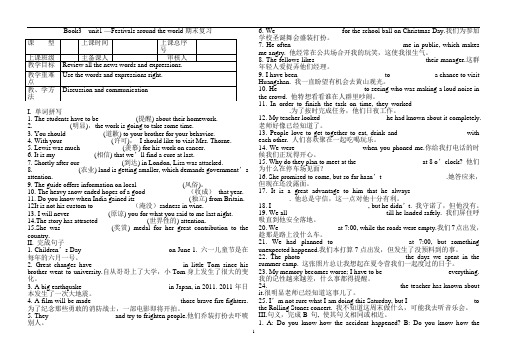
Book3 unit1 —Festivals around the world期末复习I. 单词拼写1. The students have to be __________ (提醒) about their homework.2. __________ (明显),the work is going to take some time.3. You should __________ (道歉) to your brother for your behavior.4. With your______________ (许可),I should like to visit Mrs. Thorne.5. Lewis was much ____________(羡慕) for his work on cancer.6. It is my ___________(相信) that we’ll find a cure at last.7. Shortly after our ____________(到达) in London, Lisa was attacked.8. _____________(农业) land is getting smaller, which demands government’s attention.9. The guide offers information on local _____________(风俗)。
10. The heavy snow ended hopes of a good ___________ (收成)that year.11. Do you know when India gained its _______________ (独立) from Britain. 12It is not his custom to ___________(淹没)sadness in wine.13. I will never ___________(原谅) you for what you said to me last night.14.The story has attracted ______________(世界性的) attention.15.She was ______________(奖赏) medal for her great contribution to the country.II. 完成句子1. Children’s Day ____________ ____________ on June 1. 六一儿童节是在每年的六月一号。
人教版高中英语必修3全册学案
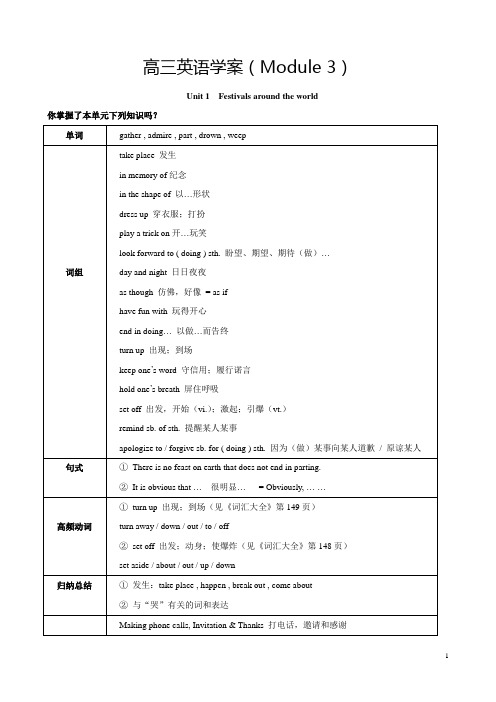
高三英语学案(Module 3)Unit 1 Festivals around the world你掌握了本单元下列知识吗?1. gather (见《词汇大全》第63页)(vt.)聚集,归拢;增加(速度、力量等);(云层、黑暗等)逐渐增加,积聚;积聚(力量、精神等);使做好准备【课文原句】People are grateful because their food is gathered for the winter and the agricultural work is over. 【重要词组】gather courage to do sth. 鼓起勇气做某事(也可用take)【举例】①人们慢慢地把他们的所有物收集起来,然后离开了大厅。
②这辆车在加速。
③暴雨云层在聚集。
④他重拾信心做最后一搏。
⑤我坐了一会儿以积聚力量。
2. admire (见《词汇大全》第4页)(vt.)钦佩;赞美;羡慕;欣赏【课文原句】China and Japan have mid-autumn festivals, when people admire the moon and in China, enjoy mooncakes.【重要词组】admire sb. for ( doing ) sth. 钦佩/ 羡慕/ 赞美某人(做)某事【举例】①中秋节,中国人有赏月的习俗。
②她每天对着镜子孤芳自赏。
③我们很钦佩他的睿智和勇敢。
3. part (见《词汇大全》第97页)(n.)部分;作用;成分;零件;角色(vt./ vi.)(使)分开;(使)分离;断绝关系(adv.)partly 在某种程度上;部分地【课文原句】There is no feast on earth that does not end in parting.【重要词组】take part in 参加play a part in 在…中起作用/ 扮演角色part with sth. (不情愿)放弃;与…分开【举例】①他们轻轻地拥抱了一下便分别了。
人教版高中必修三英语Unit1单元复习学案(重点导学、操练巩固)
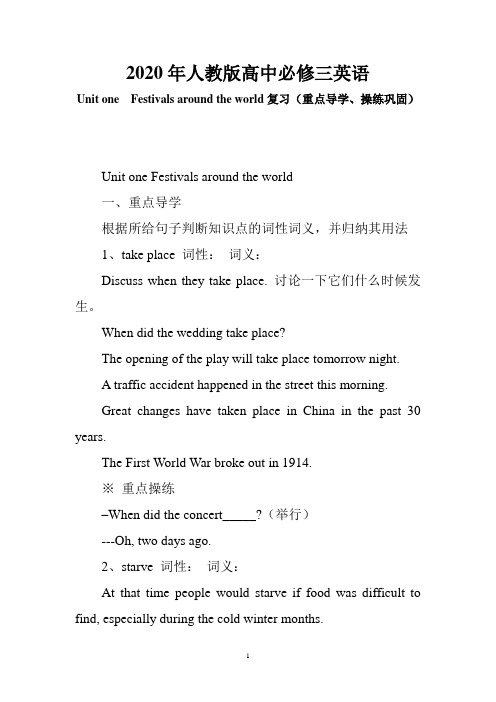
2020年人教版高中必修三英语Unit one Festivals around the world复习(重点导学、操练巩固)Unit one Festivals around the world一、重点导学根据所给句子判断知识点的词性词义,并归纳其用法1、take place 词性:词义:Discuss when they take place. 讨论一下它们什么时候发生。
When did the wedding take place?The opening of the play will take place tomorrow night.A traffic accident happened in the street this morning.Great changes have taken place in China in the past 30 years.The First World War broke out in 1914.※重点操练–When did the concert_____?(举行)---Oh, two days ago.2、starve 词性:词义:At that time people would starve if food was difficult to find, especially during the cold winter months.那个时候如果食物难找人会饿死的,尤其是寒冷的冬天。
Many children in Africa are starving to death.Because there is no food, the people are starving.If you waste any food again, I will starve you.Some people starve themselves to lose weight.※重点操练They ______ for the experience of practical work.(迫切需要)3、dress up 词性:词义:It is now a children’s festival, when they can dress up and go to their neighbor’s homes to ask for sweets.现在成了一个儿童节日,节日期间孩子们打扮起来,去邻居家要糖果。
高中英语Unit1SectionⅠReadingandThinking学案新人教版必修第三册(含答案
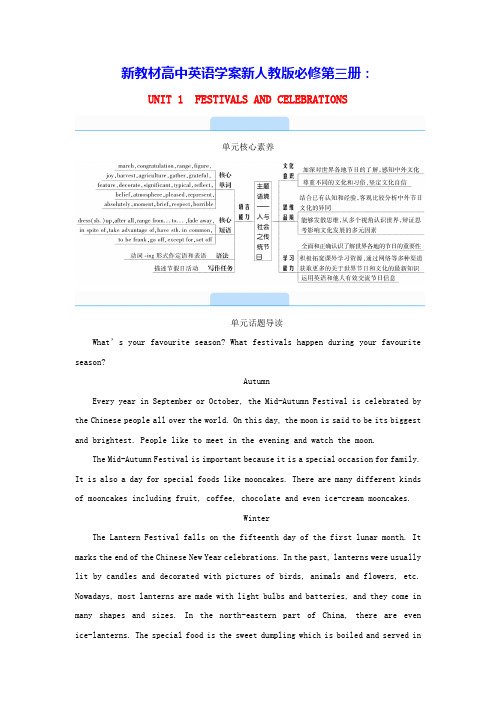
新教材高中英语学案新人教版必修第三册:UNIT 1 FESTIVALS AND CELEBRATIONS单元核心素养单元话题导读What’s your favourite season? What festivals happen during your favourite season?AutumnEvery year in September or October, the Mid-Autumn Festival is celebrated by the Chinese people all over the world. On this day, the moon is said to be its biggest and brightest. People like to meet in the evening and watch the moon.The Mid-Autumn Festival is important because it is a special occasion for family. It is also a day for special foods like mooncakes. There are many different kinds of mooncakes including fruit, coffee, chocolate and even ice-cream mooncakes.WinterThe Lantern Festival falls on the fifteenth day of the first lunar month. It marks the end of the Chinese New Year celebrations. In the past, lanterns were usually lit by candles and decorated with pictures of birds, animals and flowers, etc. Nowadays, most lanterns are made with light bulbs and batteries, and they come in many shapes and sizes. In the north-eastern part of China, there are even ice-lanterns. The special food is the sweet dumpling which is boiled and served inhot water.SummerThe Dragon Boat Festival falls on the fifth day of the fifth month of the lunar year. As it is in early summer, it marks the beginning of the hottest season of the year. The tradition of the Dragon Boat Festival started more than 2, 000 years ago. In the old days, dragon boat races were organised only by Chinese people. However, in recent years, people from other cultures have also taken part in the races and enjoyed the fun. There is a special food for the festival. It is called zongzi, which is sticky rice in fresh bamboo leaves.Section ⅠListening and Speaking,Reading and Thinking课前自主预习Ⅰ.重点单词1.__lantern__ n.灯笼;提灯2.__costume__ n.(某地或某历史时期的)服装;戏装3.__march__ vi. & n.行进;前进;示威游行4.__congratulate__ vt. 向(某人)道贺;(因某事)为自己感到自豪→__congratulation__ n.祝贺;恭喜5.__riddle__ n.谜语;神秘事件6.__ceremony__ n.典礼;仪式7.__range__ n.一系列;范围,界限vi. 包括;(在一定范围内)变化8.__origin__ n.起源;起因;出身→__originate__ vi. 起源→__original__ adj. 原来的;最初的n.原件;正本;原稿→__originally__ adv. 原来;起初9.__religion__ n.宗教;宗教信仰→__religious__ adj. 宗教的;笃信宗教的10.__figure__ n.人物;数字;身材vt. 认为;认定11.__charm__ n.魅力;迷人的特征;咒语→__charming__adj. 令人着迷的;迷人的;吸引人的12.__joy__ n.高兴;喜悦→__joyful__ adj. 高兴的;快乐的13.__gratitude__ n.感激之情;感谢→__grateful__ adj. 感激的;表示感谢的14.__harvest__ n.收获季节;收获;收成vi. & vt. 收割(庄稼);捕猎(动物、鱼) 15.__agriculture__ n.农业;农艺→__agricultural__ adj. 农业的16.__crop__ n.庄稼;作物;一季的收成17.__gather__ vi. 聚集;集合vt. 聚集;搜集;收割→__gatherer__ n.采集者→__gathering__ n.聚集;聚会18.__feature__ vt. 以……为特色n.特色;特征;特点19.__decorate__ vt. 装饰;装潢→__decoration__ n.装饰物→__decorative__ adj. 装饰的20.__church__ n.(基督教的)教堂;礼拜堂21.__significant__ adj. 有重大意义的;显著的→__significance__ n.意义;含义;重要性22.__fade__ vi. & vt. 逐渐消失;(使)褪色;(身体)变得虚弱23.__typical__ adj. 典型的;有代表性的;平常的→__typically__ adv. 典型地,有代表性地;向来,一向→__type__ n.类型;种类24.__evil__ adj. 邪恶的;有害的;罪恶的n.邪恶;罪恶;恶行25.__commercial__ adj. 商业(化)的;以获利为目的的→__commercialis(z)e__ vt. 使商业化;利用……牟利→__commercialis(z)ation__ n.商业化26.__medium__ n.(pl. media)媒介;手段;方法adj. 中等的;中号的27.__reflect__ vt. 显示;反映;反射→__reflection__ n.映像;思考;反映28.__belief__ n.信仰;信心;信任→__disbelief__ n.不信;怀疑;疑惑→__believe__ vt. & vi. 相信29.__faith__ n.宗教信仰;信任;相信→__faithful__ adj. 忠实的→__faithfully__ adv. 忠实地30.__occasion__ n.特别的事情(或仪式、庆典);(适当的)机会Ⅱ.重点短语1.dress (sb. ) __up__穿上盛装;装扮2.after __all__毕竟;别忘了3.range __from__…to… 从……到……之间变化4.fade __away__逐渐消失;(身体)变得虚弱5.__in__ spite of不管;尽管6.take advantage __of__利用;欺骗;占……的便宜7.__the__ media大众传播媒介8.have sth. __in__ common (兴趣、想法等方面)相同;有相同的特征9.__take__place举行;发生10.decorate… __with__…用……装饰11.play a role __in__在……中起作用12.__with__the development of随着……的发展13.drive __away__驱赶;驱车离开Ⅲ.重点句型1.However,__no matter how__ different they may seem,all over the world,the spirit of sharing joy,gratitude,love,or peace is common in all festivals.然而,无论它们看起来多么不同,在这个世界上,分享快乐、感恩、爱或和平的精神是所有节日共有的。
高中英语(新教材)人教版选择性必修第三册学案:Unit1 Speaking and Listening Talking (含解析)
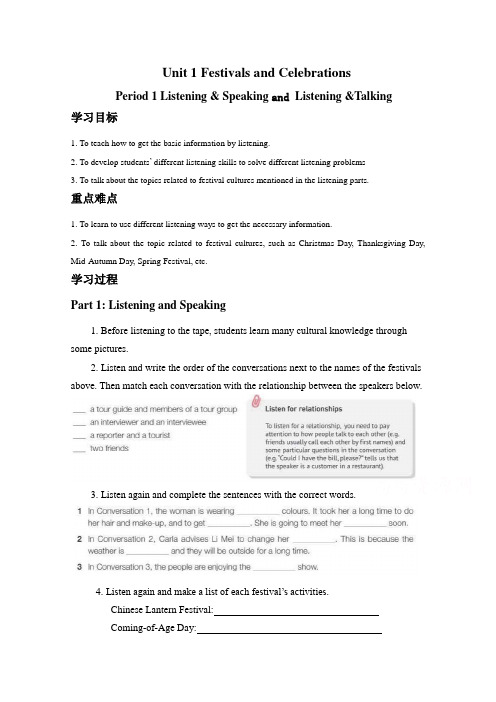
Unit 1 Festivals and CelebrationsPeriod 1 Listening & Speaking and Listening &Talking学习目标1. To teach how to get the basic information by listening.2. To develop students’ different listening skills to solve different listening problems3. To talk about the topics related to festival cultures mentioned in the listening parts.重点难点1. To learn to use different listening ways to get the necessary information.2. To talk about the topic related to festival cultures, such as Christmas Day, Thanksgiving Day, Mid-Autumn Day, Spring Festival, etc.学习过程Part 1: Listening and Speaking1. Before listening to the tape, students learn many cultural knowledge through some pictures.2. Listen and write the order of the conversations next to the names of the festivals above. Then match each conversation with the relationship between the speakers below.3. Listen again and complete the sentences with the correct words.4. Listen again and make a list of each festival’s activities.Chinese Lantern Festival:Coming-of-Age Day:Rio Carnival:5: in pairs, discuss which of these festivals attracts you the most and why.ExampleA: I think the Rio Carnival would be the most exciting. After all, as you know, I love to dance.B: I love dancing, too, but I’m not sure I’d enjoy it in such hot weather.A: So which festival do you like best?B: I like…Pronunciation一. Listen and read aloud the word or phrases to your partner. Pay attention to change in the pronunciation of the bold letters.(1) d uty, e d ucation (2) u s e, u s ually (3) new s, new s paper (4) i s, i ss ue(5) las t year (6) i n bed (7)tho s e shirts (8) a s you see二. Listen to the following sentences, paying attention to the consonants in bold. How do their pronunciations change when they are read in the sentences?(1). Di d you enjoy the holiday?(2). Miss, congratulations o n becoming an adult!(3). It’ll b e too tiring to walk or dance for a long time in tho s e shoes.(4). I was hoping to hear tha t you had a great time throughout.(5). Children then take part in Easter egg hunts to find the eggs and wi n prizes.(6). I n Mexico, the Day of the Dead is celebrated between October 31st and November2nd.Discuss the differences with your partner. Then listen and repeat.Part 2: Listening and Talking1.Listen the conversation between Song Lin and Max and answer the following questions.(1)What festival is Max taking about?(2)What did Max do during the festival?(3)W hat dishes did Max’s mother cook?(4)What did Max and his family do during and after the dinner?(5)What was the best part of the festival?2. Listen again and tick the phrase that Max or Song Lin uses.Expressing feelings and emotionsIt was fantastic! How wonderful! How Exciting!T hat’s amazing It was great fun! It’s very exciting.I t was great to… I’m really happy that… I’m pleased to…3. Read the conversation below and underline the phrases that express feelings aboutfestivals. Role-play the conversation with your partner.Joe: Did you enjoy the holiday, Song Lin?Song Lin: Oh yes, it was great, thanks! The food, the parades, and the beautiful fireworks---it’s always exciting for me. It’s good to spend time with myfamily, too, although it can get a bit boring in my hometown after a while.How about you?Joe:Well,this was my first Chinese New Year. I loved watching the traditional performance, and I was invited to lots of delicious meals. But, to be frank,the fireworks going off throughout the night were really annoying.Song Lin: Oh, well, yes, I can see your point there! But it’s all part of the tradition to frighten away the evil spirits.Joe: Yes, well, there seemed to be a lot of them in my area! Anyway, except for that, everything was fine, I’m really looking forward to the nextfestival.4. HomeworkShare a recent festival experience with your partner and tell him/her how you felt about the festival and why.。
高一英语人教版必修三复习Unit1 导学案与答案
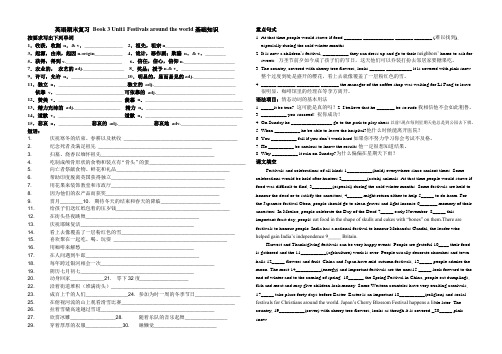
英语期末复习Book 3 Unit1 Festivals around the world基础知识按要求写出下列单词1.收获,收割n.& v._______________ 2.祖先,祖宗n_______________________3.起源,由来,起因n.origin___________ 4.诡计,恶作剧;欺骗n.& v.________5.获得,得到v.______________________ 6.信任,信心,信仰n.____________________ 7.农业的,农艺的adj.________________ 8.奖品;授予n.& v._____________________ 9.许可,允许n.______________________10.明显的,显而易见的adj.________________ 11.独立n.___________________________独立的adj.________________________________ 依靠v.___________________________可依靠的adj._______________________________ 12.赞美v._________________________ 羡慕n.______________________________________ 13.精力充沛的adj.__________________ 精力n.______________________________________ 14.道歉v.__________________________道歉n.______________________________________ 15.悲哀n._____________悲哀的adj.______________悲哀地adv.______________________短语:1. 庆祝寒冬的结束、春耕以及秋收________________________________________2. 纪念死者及满足祖先________________________________________3. 扫墓、烧香以缅怀祖先________________________________________4. 吃制成颅骨形状的食物和装点有“骨头”的蛋__________________________________5. 向亡者祭献食物、鲜花和礼品________________________________________6. 帮助印度脱离英国获得独立________________________________________7. 用花果来装饰教堂和市政厅________________________________________8. 因为他们的农产品而获奖________________________________________9. 赏月________10. 期待冬天的结束和春天的降临_____________________11. 给孩子们送红纸包着的压岁钱________________________________________12. 在街头昼夜跳舞________________________________________13. 庆祝耶稣复活________________________________________14. 看上去像覆盖了一层粉红色的雪________________________________________15. 喜欢聚在一起吃、喝、玩耍________________________________________16. 用咖啡来解愁________________________________________17. 在人间遇到牛郎________________________________________18. 每年跨过银河相会一次________________________________________19. 阴历七月初七________________________________________20. 动身回家____________21. 零下32度_________________22. 沿着街道堆积(堆满街头)________________________________________23. 成百上千的人们_______________24. 参加为时一周的冬季节日________________25. 在俯视河流的山上观看滑雪比赛________________________________________26. 拉着雪橇高速越过雪道________________________________________27. 欣赏冰雕________________28. 随着乐队的音乐起舞_______________29. 穿着厚厚的衣服_____________30. 睡懒觉______________________ 重点句式1. At that time people would starve if food _______ ____________ _______ _______ (难以找到), especially during the cold winter months.2. It is now a children’s festival, __________ they can dress up and go to their neighbors’ home to ask for sweets. 万圣节前夕如今成了孩子们的节日,这天他们可以乔装打扮去邻居家要糖果吃。
高一英语新人教版必修3unit 1学案

Book 3 Unit 1 Festivals around the worldLearning about language(学案)一、Learning target(学习目标)Vocabulary:1).words:二、Learning procedures(学习过程)Step 1 Practice before classA、sentence translation (汉译英)1、很明显他明白了你说的话______________________________________________________________________________ 2、他好像很忙______________________________________________________________________________ B、ListeningLesson28 No parking 禁止停车Jasper White is one of those rare people who believes in ________myths. He has just bought a new ________ in the city, but ever since he moved in, he has had trouble with_________. When he returns home at night, he always finds that someone _____ ________ a car outside his gate. Because of this, he has not been able to get his own car into his _________even once. Jasper has put up’ No Parking’ signs outside his gate, but these have not had any __________. Now he has put an ugly _____ head over the gate. It is one of the ugliest faces I have ever seen. I asked him what it was and he told me that it was Medusa, the Gorgon. Jasper hopes that she will turn motorists to stone. But none of them has been turned to ________ yet!Step 2 Word studyTask 1 RevisionMany people think that Christmas is a western __________, but in fact it is really a worldwide holiday. Christmas actually as a _______ festival celebrated by _________ around the world. Its ______ is around the 3rd or 4th century AD, when the _______ of remembering Jesus’ birth on December 25th first started. Today, of course, many people celebrate Christmas __________ it were just a holiday to ______________ family, rather than a holiday about a _______.Task 2 Which of these words can become adj. with-ous or –al ending?Task 3. Self –digestion1.The ______ (arrive) of the aircraft has been delayed due to the heavy fog.2.Teachers should train the students to think and work _________(depend)3.He looked more _________( energy) after the operation.4.Smoking is not __________( permission) here.5.People’s Daily is a ___________(nation) newspaper.6.They got lost in the desert and died of __________(starve).7.Don’t be so _______(fool). He won’t go with you.8.China is a large _________(agriculture) country, which is developing very fast.9.This is not his fault. Make an __________(apologize) to him.10. He was so ________(sadness)Task 4:Self – developmentPractice 1worldwide holiday. Christmas actually as a _______ festival celebrated by _________ around the world. Its ______ is around the 3rd or 4th century AD, when the _______ of remembering Jesus’ birth on December 25th first started. Today, of course, many people celebrate Christmas __________ it were just a holiday to ______________ family, rather than a holiday about a _______.Practice 2A.take place/ happen/ break out1.The Olympics _________ every four years.2.How did the accident ___________?3.World War I __________ in 1914.B.award / prize1.He won the ________ for the best student of the year.2.Medals _________ to the best speakers on the debating team/3.He received the Nobel Peace ___________ for his great contribution to the world.C.celebrate / congratulate1.Festivals are meant to __________ important events.2.Well done. I must _________ you on your success.3.The three sisters decided to hold a family party to _________ their parents’ silver wedding.。
人教版英语必修三 Unit 1 学案【单元全套】(精修版)

人教版英语精品资料(精修版)Unit 1 Festivals around the world1.Teaching aims of this unitTalk about festivals and celebrationsTalk about the ways to express request and thanksLearn to use Modal verbsWrite a similar story with a different ending2.Sentence patterns:Request:Could/ Would you please…?Could I have…?Could we look at…?I look forward to…May I see…?Thanks:It’s very kind of you…Thank you very much/ Thanks a lot.I’d love to.It was a pleasure…Don’t mention it.You are most welcome.3.Modal verbs:May might, can could will would shall should must canThe first period Speaking1.Teaching aims:V ocabulary: take place, lunar, festival, Army Day, Christmas, dress upPhrases: Would you like … Could I have…?Might I offer hel p…? May I see…?You should try…Could we like at…?Can you suggest…? We might take…Teaching ProceduresStep I Leading inT: Hello, everybody! Welcome back to school! Did you have a good time in your winter holidays?Ss. Yes. Of course!T: When did you feel most happy and excited?Ss: At the Spring Festival.T: Who can tell us why? Any volunteers?S1: Because it is the most important festival in our country.S2: Because I got a lot of lucky money from my parents.S3: Because I needn’t study at f estivals and there was a lot of delicious food to eat.How great.S4: Because I met my cousins and friends who I hadn’t seen for a long time.T. Very food! I am glad to hear that. Today we will talk about festivals, which are meant to celebrate important events. Please think about some other festivals. Can you name just a few?Ss: New year, Yuan xiao festival…:T: Quite right. That’s called the Lantern’s Festival. How about some other festivals?Ss: The Army Day, International Labour’s Day, National Day, Tomb Sweeping Festival, Dragon Boat Festival, Mid-autumn Day…T: You have done a good job, boys and girls! .Step ⅡWarming –upFestivals are meant to celebrate important events. Different countries have different festivals. Work in groups and lost five Chinese festivals that you know.Discuss when they take place, what they celebrate and one thing that people do at that time. The first one is given to you as an example.Step ⅢPre- readingDiscuss in groups of four1.What’s your favourite holiday of the year? Why?2.What festivals or celebrations do you enjoy in your city or town? Do you likespending festivals with your family or with friends? What part of a festival do you like best---the music, the things to see, the visits or the food?Step ⅣAssignment1.Consolidation2.Listening to the material again after class to be familiar with it.3.Homework: Collect as much information about festivals as possible.The second period ReadingTeaching Aims1.V ocabulary: starve, starvation, plenty, satisfy ancestor lamps lead feast bone originin memory of dress up trick poet arrival national gain independencegather agricultural European custom awards watermelon handsomerooster admire look forward to religious as though have fun with daily 2.To enable the students to know the earliest festivals with reasons for them and four different kinds of festivals that occur in most parts of the world3.To enable the students to master some English expressions and phrases about festivals.4.Teach the basic reading skills: skimming and scanning.5.Try to compare and make conclusion s of different festivals.Step ⅠRevision1.Greetings.2.Review the new words of this part.3.Check the students’ home work---festivalsStep ⅡReading1.ScanningT: Open your books and turn to page one. I’d like you to do the scanning. Read the text quickly and accurately to get the main idea and answer the 6 questions on Page3. ( Ask the student to look through the questions and then read the text silently.)( Four minutes later, check the answers with the whole class. Show the suggested answers on the screen.)2.Intensive reading( Allow the students to read aloud and carefully this time to understand the main ideas of each paragraph and the important details)T: Read the text loudly for a second time and them try to tell if these sentences are True or False.3.Reading and discussionT: Read the text a third time and then work impairs to do Exercise 2 on Page 3.( Let the students have enough time to read the passage carefully and discuss the chart with their partners. Encourage them to expand their answers according to their ownexperiences.)4.Explanation(In this part try to help the students analyse the difficult, long and complex sentences and guess the meaning of the new words; ask them to deal with the language points in the context.)T: Now I will discuss some important sentences and phrases in the passage.a.Some festivals are held to honor the dead, or satisfy and please the ancestors,who could return either to help or to do harm.b.In memory ofc.In India there is a national festival on October 2 to honor Mahatma Gandhi,the leader who helped ga in India’s independence from Britain.d.People are grateful because their food is gathered for the winter, and becausea season of agricultural work is over.e.The most energetic and important festivals are the ones that look forward tothe end of winter and to the coming of spring.f.The country is covered with cherry flowers so that it looks as though it mightbe covered with pink snow.The suggested explanation:a.An attributive clause.The sentence means people hold some festivals either to show respect to the dead or to make their ancestors happy in case they might come back to do harm.b.in memory of … serving to recall sb, to keep him fresh in people’ minds.He wrote a poem in memory of his dearest wife, who died in an accident.in honor of ( showing great respect or high public regard)in hopes/the hope of (hoping)in defence of (defending)c. a noun phrase followed by an attributive clause as the appositived.two clauses for reasone.energy→energetic adj. ( full of or done with energy)look forward to ( to is a preposition here.)devote to, be/get used to, get down to , stick toe.g. I’m looking forward to hearing from you.Step ⅢListeningT: Now I will play the tape for you. You can just listen with your books closed or look at your books or read in a low voice together with the tape. It’s up to you. After listening, please write down three things that most festivals seem to have in common.( Comprehending Ex.3 on Page 3).The third period Learning about languageTeaching aims:1.Let the students know the usage of modal verbs.2.Enable the students to recognize the words and expressions in the reading passageaccording to what mean the same as them.Step ⅠGreeting and Revision( Ask some students to retell the text we learned .)StepⅡ. Practicing the useful words and expressionsT: As we know, there are two important kinds of verbs---transitive verbs and intransitive verbs. But many intransitive verbs have the structure “verb+preposition+objects ” Can you give me some examples?Ss: Sure. Such as look at the picture, hear from my friends, listen to the radio and so on.T: Ok. Now turn to page 4, Ex. 4. You are to make some sentences of your own, using the words given.S1. I’m looking forward to hearing form my friendS2: We are talking about verbs.S3: Would you like to talk with me?S4: Who can think of an effective solution to the problem?S5: Please think about my proposal.Step ⅢUseful StructuresT: Let’s come to the next part. This part is about modal verbs. You are to read the sentences in Ex. 1 and then to find out and write down different sentences with modal verbs form the reading passage and try to explain their meanings. If you have any difficulty in understanding them you can refer to Grammar in Pages 92---94Step ⅣSumming up and home workT: Boys and girls, today we have practiced useful words and phrases of this unit and the usage of modal verbs. I think it is not easy for you to master them, after class you should review them.Homework1.Practice of WBP42EX.1,2,3.2.Please find out10 sentences with modal verbs, and try to get their meanings.The fourth period ListeningTeaching aims:1.V ocabulary: go with, the big bands, musicians, over and over again, for sale, getused to, the winners of this year’s awards for the best costumes2.Enable the students to know how to get the key words to understand theconversation about the carnival parade, to talk about sth happened and express request and thanks.Step ⅠRevisionAfter checking the WB Ex. 1,2,3 the teacher ask the students to give examples about modal verbs and try to explain them.Step ⅡWarming upT: By the way, what’s the topic of this unit?Ss: Festivals around the world.T: Would you like to know something more about festivals around the world?Ss: Of course.T: Now I will show you several pictures. What’s the festival called?Ss: Carnival.T: Yes. This class we will listen to a dialogue about carnivals. First look through the four questions in listening part to find out the listening points.Step ⅢListeningT: I will play the tape for you twice. Please listen carefully and pay much attention to the important points. For the first time you are to make notes beside thequestions. For the second time, you should write down the answers andthen check them with your partners.( It’s important to encourage the students to adapt their present knowledge anyskill to a variety of situations wherever they can. Make sure to allow various expressions of the answers. Do not demand the same words form all students.)Step ⅣSpeakingThis part is intended to give the students the opportunity to practice a telephone conversation using the functional items for requests and thanks. Thepolite form of English are important and should be practiced in a varietyof situations.Step ⅤListening taskT: There are about 10 minutes left. Let’s come to listening task. Turn to page 43and look at the pictures. They have something in common. Can you find it out?Ss: They are all about festivals bout the dead.T: That’s right. I will p lay the tape for you. For the first time you should try towrite down the name of the country where the festival are held. For the next two times you should do Ex2. You can make a brief note first and then complete the chart,according to which you can make a report.The fifth period Extensive readingTeaching aims:1.V ocabulary: heart-broken, turn up, keep one’s word, hold one’s breath, drownone’s sadness in coffee, set off for, remind somebody of something,2.Learn to compare the festivals in China and in western countries.Step ⅠRevisionCheck homeworkStep ⅡReading (1)T: As we know, there are all kinds of festivals around the world. We have talked about two Chinese festivals for the dead. Today we are going ti read a sad story, which is to introduce a cross cultural view of lovers’ festival—Qi Qiao and Valentine’s Day. NowT: I think you have got the general idea of the passage. Now please read the passage once more and answer the questions on Page 8.Step ⅢDiscussion and writingT: That’s for the reading part of the passage. Please think about the ending of the story. Are you satisfied with the ending? Different people have different opinions to a matter. Now any one of you have an opportunity to make up an ending to the story. Please engage imaginatively in the story and use your own ideas. Try to use the vocabulary and structures you have learned of you like.Step ⅣReading(2)T: Let’s come to another passage about carnival in Quebec. Please turn to Pa ge 44, read it quickly and answer the questions in Page 45. Five minutes for you.Added material:Thanksgiving DayFourth Thursday in November is celebrated as ‘Thanksgiving Day’ People thank God for his blessings. People can ‘Thank’ friends, foes and a nyone for the experiences, happiness and sunshine they bring into their lives. Pilgrims celebrated the first Thanksgiving Day in America during the second winter in the new world. The first winter had been bad as nearly half of the people had perished due to lack of food and bad weather. But the following year, with the help of Indians who showed them how to plant Indian corn, the pilgrims had successful harvest. Governor William Bradford decided that December 13, 1621 be set aside for feasting and prayer. The Indians were invited to share the festival. Since than, Thanksgiving Day is been celebrated in America. However, it was only in 1941, the Congress in a joint resolution named the fourth Sunday in November as the official Thanksgiving Day.Dating back, it is known that the Council thought to appoint and set apart the 29th day of June, as a day of Solemn Thanksgiving and praise to God for his Goodness and Favour. The First Thanksgiving Proclamation was however on June 20, 1676. The governing council of Charlestown, Massachusetts, held a meeting to determine how best to express thanks for the good fortune that had seen their community securely established. By unanimous vote they instructed Edward Rawson, the clerk, to proclaim June 29 as a day of thanksgiving, It is also known that the Pilgrims set ground at Plymouth Rock on December 11, 1620. Their first winter was devastating. At the beginning of the following fall, they had lost 46 of the original 102 who sailed on the Mayflower. But the harvest of 1621 was a bountiful one. And the remaining colonists decided to celebrate with a feast -- including 91 Indians who had helped the Pilgrims survive their first year. It is believed that the Pilgrims would not have made it through the year without the help of the natives The feast was more of a traditional English harvest festival than a true "thanksgiving" observance. It lasted three days.Thanksgiving, as we know it today, has come a long way from the Pilgrim's harvest festival in 1621. It is an event that seems, as each year goes by, to reinvent itself and to expand its meaning to larger vistas. Maybe this is the real significance of the occasion; for as we continue to change and grow as a people, there are an increasing number of things for which we can be thankful.HalloweenThe ancient Druids 督伊德教(古代高卢人与不列颠人的一种宗教)的教徒who inhabited what we now call Great Britain placed great importance on the passingof one season to the next, holding "Fire Festivals" which were celebrated for three days (two days on either side of the day itself). One of these festivals was called Samhain (pronounced Sha-Von) and it took place on October 31 through to November 1. During this period, it was believed that the boundaries between our world and the world of the dead were weakened, allowing spirits of the recently dead to cross over and possess the living. In order to make themselves and their homes less inviting to these wayward spirits, the ancient Celts(凯尔特人)would douse (插入水中, 把弄熄, 弄湿)all their fires. There was also a secondary purpose to this, after extinguishing all their fires, they would re-light them from a common source, the Druidic fire that was kept burning at Usinach, in the Middle of Ireland.Samhain was considered to be a gateway not only from the land of the dead to the land of the living, but also between Summer and Fall/Winter. For the Druids, this was the last gasp (喘息, 气喘)of summer (it was also the Celtic New Year), sotherefore they made sure it went out with a bang before they had to button down (把...弄清楚)for the winter ahead.They would dress up in bizarre costumes and parade through their villages causing destruction in order to scare off any recently departed souls who might be prowling (巡游)for bodies to inhabit, in addition to burning animals and otherofferings to the Druidic deities(神, 神性). It is also a popular belief that they would burn people who they believed to be possessed, but this has largely been debunked (揭穿, 拆穿假面具, 暴露)as myth.This tradition was later brought to the North American continent by Irish immigrants who were escaping the Potato Famine in their homeland. In addition to the festival itself, the immigrants brought several customs with them, including one of the symbols most commonly associated with Halloween -- the Jack 'O Lantern. According to Irish folklore, there once lived a man named Jack who was known for being a drunk and a prankster(顽皮的人, 爱开玩笑的人). One night Jack tricked thedevil into climbing a tree, and quickly carved an image of a cross on the trunk, trapping the devil. Jack then made him promise that, in exchange for letting him out of the tree, the Devil would never tempt him to sin again. He reluctantly agreed, but was able to exact his revenge upon Jack's death. Because of his mischievous ways in life, Jack was barred from entering heaven and because of his earlier trick, he was also barred from hell. So he was doomed to wander the earth until the end of time, with only a single ember(灰烬, 余烬)(carried in a hollowed out turnip.[植]芜箐, 芜箐甘蓝) to warm him and light his way.In Ireland, they originally also used turnips for their "Jack Lanterns", but upon arriving in the new world, they discovered that pumpkins were abundant and easier to carve out.EasterOn Good Friday, Jesus Christ was executed by crucifixion. His body was taken down from the cross, and buried in a cave. The tomb was guarded and an enormous stone was put over the entrance, so that no-one could steal the body. On the following Sunday, some women visited the grave and found that the stone had been moved, and that the tomb was empty. Jesus himself was seen that day, and for days afterwards by many people. His followers realised that God had raised Jesus from the dead.Hot Cross BunsHot Cross buns are still made all over England around Easter time. At one time, buns with a cross on them were made all through Lent. They were banned by Oliver Cromwell and brought back again at the time of the Restoration. For a time they were only available on Good Friday but now they can be bought during the month leading up to Easter. Whole meal hot cross buns are becoming more popular each year.The Easter EggAs with the Easter Bunny and the holiday itself, the Easter Egg predates the Christian holiday of Easter. The exchange of eggs in the springtime is a custom that was centuries old when Easter was first celebrated by Christians.From the earliest times, the egg was a symbol of rebirth in most cultures. Eggs were often wrapped in gold leaf or, if you were a peasant, colored brightly by boiling them with the leaves or petals of certain flowers.Today, children hunt colored eggs and place them in Easter baskets along with the modern version of real Easter eggs -- those made of plastic or chocolate candy.O-bon FestivalBon DanceDuring o-bon, bon odori (folk dances) are held all over Japan. The kind of dance varies from area to area. People wearing yukata (summer kimono) go to theneighborhood shrine, temple, or park and dance around a yagura (stage) set up there. Anyone can participate in the dance. Join the circle and imitate what others are doing. Awa odori of Tokushima and bon odori at Yasukuni Shrine, Tokyo are very famous.Also, Toro Nagashi (floating paper lanterns) are held in some areas. On the evening of the 15th, people send off ancestor's spirits with a paper lantern, lit by a candle inside and floated down a river to the ocean. Fireworks displays (Hanabi-taikai) are often held during o-bon. It is a typical Japanese summer scene to see hanabi. Since o-bon is an important family gathering time, many people return to their hometowns during o-bon. Most businesses are closed during this time. Although it is crowded everywhere, it is common for many people take trips during o-bon, too. The beginning and end of o-bon are marked with terrible traffic jams. Airports, train stations, and highways are jammed with travelers. I recommend you do not travel around o-bon!Unit2 Healthy eatingTeaching Aims of this unit1.Talk about healthy eating2.Making suggestions or giving advice on diet3.Distinguish the meanings of Modal verbs4.Make a balanced menu5.V ocabulary:6.fiber,digestion,bean,slim,curiosity,lie,debt,glare,limit,benefit,item,protective getrid of, throw away, get away with, tell lies, earn one’s living in debt ,set out run one’s business ,carry on7.Speaking: Practice talking about your ideas; practice giving suggestions andadvice, practiceseeing the doctor.8. The use o f ought toThe first period Warming up and readingStep ⅠWarming upReview the words of foods by showing their pictures. First, ask students to list the foods they like best. Then tick off 3 of them they eat most often. Second, show the three groups of foods and see which group their foods belong to. Third, ask the students to tell us in what ways their foods help them grow.Step ⅡPre-readingGet the students to discuss the questions with their partners in this part. Then askthem to report their work. This part will help the students understand the text.T: Please look at the slide show and discuss the questions with your partners. Then I’ll ask you to report your work. Are you clear?Step ⅢReadingGet the students to comprehend the passage quickly and accurately and meanwhile help the students to form a good habit of reading. Give the students a couple o f minutes to look through the whole passage. Tell the students to read the text silently and then ask for the main idea of the text on the slide show with their partners. Encourage the students to express their ideas.1.Fast readingIn this part ask the students to read the text quickly for the first time and find out the main idea of the text. Then ask them to read the text again carefully to obtain some details. Before reading show the tasks and let the students read the tasks first. This text will help them have a good understanding of the text.a.The two restaurants supplied the healthy diet.b.The reason why Yong Hui’s restaurant was so popular withcustomers.c.Wang Pengwei found out why he had lost his customers and decidedto win them back2.Careful readingT: Now it is time for us to read the text carefully and decide which sentences are true. Then correct the false ones. First read the sentences.ually Wang Pengwei’s restaurant was full of people. (T )b.Yong Hui served a balanced diet. ( F)c.Yong Hui could make people thin in two weeks by giving them a gooddiet. (F)d.Wang Pengwei’s customers often became fat after eating in hisreataurant. (T)e.Yong Hui’s menu gives them energy foods. (F )f.Wang Pengwei’s menu gives tem foods containing fiber. (F )g.Wang Pengwei admired Yong Hui’s restaurant when he saw the menu.(F )h.Wang Pengwei decided to copy Yong Hui’s menu. (F )Step ⅣComprehendingBy now, the students have had a further understanding of the text.Let the students read the text again and find out the differences between the two restaurant.T: Now please read the text again and fill in the chart together with your partner.T: Until now we have known what’s wrong with both restaurant. What does it matter if you only eat at one of the restaurant?S1:…S2:…S3:…T: You all have a point here. But what will they do? We will see it next period.Facing the serious competiton Wang wasn’t lost in sadness and he didn’t quarrel with his competitor either. He went to the library to learn more about healthy eating and made his menu better than Yong Hui’s menu. Do you think we should follow his example?Ss: Yes.T: Now let’s deal with some language points. Turn to page 10, let’s look at the sentences:a.Wang Pengwei sat in his empty restaurant feeling very frustrated.This sentence means that the second action “feeling very frustrated”happened together with the main action “sat”. Pay attention to the form (v-ing) of the second action.b. Nothing could have been better.This sentence tells us that everything has worked out the way you would like. It’s a sentence that we can use in any situation.c. He couldn’t have Yong Hui getting away with telling people lies!This sentence means that he will punish Yong Hui for her telling lies.Step ⅤHomework1.Try to retell the text.2.Prepare for the language learning and do Using words and Expressionson WB (Page 49-50)The second period Language studyStep ⅠRevision1.Check the students’ homework.2.Ask some of the students to retell the text.Step ⅡWord studyThis part is a consolidation of the words in the text. Ask the students to do the exercise individually.T: Now please open your books and turn to page 11. Fill in the chart using the correct forms of the words which have the same root. Next activity is to match the definitions with the words we have learnt form the text.I necessary, you can discuss with your partners.…Step ⅢGrammarThe students will learn the usage of modal verbs. First try to make the students clear the functions of modal verbs, with the help of the practice 1on page 12. Then give them some examples.T: Please pick out all the sentences containing modal verbs in the text.a.By lunchtime they would have all be sold---It indicates possibility.b.His restaurant ought to be full of people.---It indicates possibility.c.What could have happened?--- It indicates possibility.d.Nothing could have been better.--- It indicates possibility.e.Something terrible must have happened if Maochang was not coming toeat with him as he always did.---It indicates guessing.f.He could not believe his eyes. ---It indicates intension.g.He wonder if he should go to the library to find out ---It indicates duty.h.He wouldn’t have Yong Hui getting away with telling people lies!---It indicatesintension.…Step ⅣHomework1.Review the rules of word formation and the meanings of modal verbs.2.Prepare the Using Structure on page 50 by making a dialogue in pairs.The third period ListeningStep ⅠRevision1.Check the using structure on page 50.2.Ask the students to make a short dialogue in pairs.Step ⅡListening( using language)The students will hear what Wang Pengwei did after leaving YongHui’s restaurant. Ask the students to finish the chart and answer the questions.T: OK. We have studied the text and know neither of the restaurant supplied a balanced diet. Let’s listen to the tape and see how the story went on. Go through the text quickly on page 14.( Play the tape. Students write down the answers and check the answers with their partners.)T: Now listen to it again and try to make sure your answers are right.Step ⅢListening (WB P48)The students will heat a conversation between Hong Mei and the doctor. They are asked to do exercise according to the tape.T: Doctor know that there are illnesses you may get if you do not eat properly. In the following part, we are going to listen to a dialogue. Hong Mei is going to see the doctor. Let’s see how the doctor gives her some advice. Listen carefully and do the exercises.Step ⅣHomework1.Pre-view the reading(2) and reading task on Page 52. See how the storyended.2.Find some information about healthy eating on the Internet.The fourth period Extensive readingStep ⅠRevision1.Check the homework2.Share the information the students have got form the Internet.。
高中英语:Module 3 Unit 1复习学案新人教版必修3
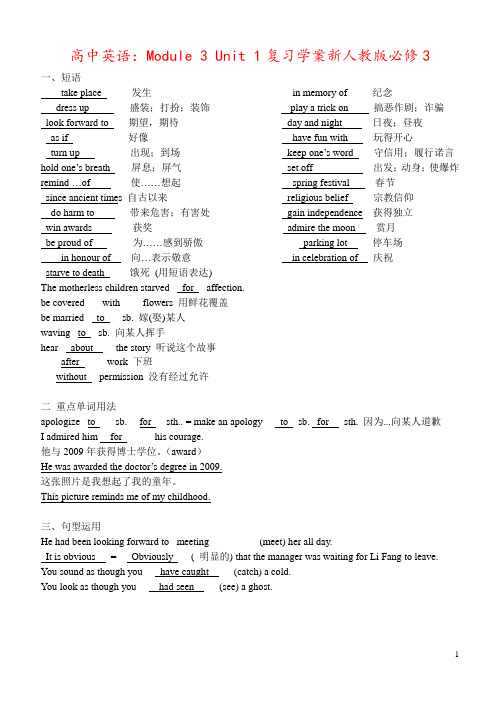
高中英语:Module 3 Unit 1复习学案新人教版必修3一、短语____take place_ 发生__in memory of___ 纪念___dress up_____ 盛装;打扮;装饰__play a trick on___ 搞恶作剧;诈骗_look forward to_ 期望,期待 _day and night____ 日夜;昼夜__as if________ 好像__have fun with___ 玩得开心__turn up______ 出现;到场keep one’s word___ 守信用;履行诺言hold one’s breath_ 屏息;屏气_set off__________ 出发;动身;使爆炸remind …of____ 使……想起__spring festival___ 春节_since ancient times 自古以来_religious belief____ 宗教信仰__do harm to___ 带来危害;有害处_gain independence 获得独立_win awards____ 获奖_admire the moon_ 赏月_be proud of___ 为……感到骄傲____parking lot____ 停车场____in honour of_ 向…表示敬意in celebration of__ 庆祝_starve to death_ 饿死(用短语表达)The motherless children starved __for__ affection.be covered ___with____ flowers 用鲜花覆盖be married __to___ sb. 嫁(娶)某人waving _to__ sb. 向某人挥手hear __about____ the story 听说这个故事____after_____ work 下班___without__ permission 没有经过允许二重点单词用法apologize _to____sb. __for___sth.. = make an apology ___to__sb. _for___sth. 因为...向某人道歉I admired him __for______ his courage.他与2009年获得博士学位。
必修第3册Unit1英语一轮复习学案(人教版2019)
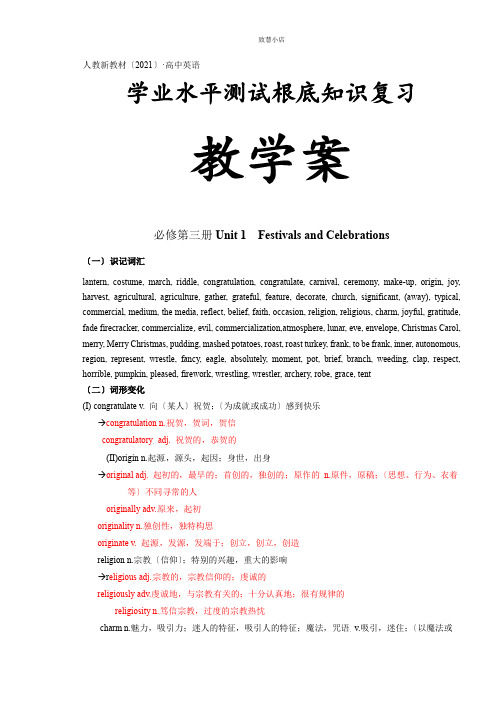
人教新教材〔2021〕·高中英语学业水平测试根底知识复习教学案必修第三册Unit 1 Festivals and Celebrations〔一〕识记词汇lantern, costume, march, riddle, congratulation, congratulate, carnival, ceremony, make-up, origin, joy, harvest, agricultural, agriculture, gather, grateful, feature, decorate, church, significant, (away), typical, commercial, medium, the media, reflect, belief, faith, occasion, religion, religious, charm, joyful, gratitude, fade firecracker, commercialize, evil, commercialization,atmosphere, lunar, eve, envelope, Christmas Carol, merry, Merry Christmas, pudding, mashed potatoes, roast, roast turkey, frank, to be frank, inner, autonomous, region, represent, wrestle, fancy, eagle, absolutely, moment, pot, brief, branch, weeding, clap, respect, horrible, pumpkin, pleased, firework, wrestling, wrestler, archery, robe, grace, tent〔二〕词形变化(I) congratulate v. 向〔某人〕祝贺;〔为成就或成功〕感到快乐→congratulation n.祝贺,贺词,贺信congratulatory adj. 祝贺的,恭贺的(II)origin n.起源,源头,起因;身世,出身→original adj. 起初的,最早的;首创的,独创的;原作的n.原件,原稿;〔思想、行为、衣着等〕不同寻常的人originally adv.原来,起初originality n.独创性,独特构思originate v. 起源,发源,发端于;创立,创立,创造religion n.宗教〔信仰〕;特别的兴趣,重大的影响→r eligious adj.宗教的,宗教信仰的;虔诚的religiously adv.虔诚地,与宗教有关的;十分认真地;很有规律的religiosity n.笃信宗教,过度的宗教热忱charm n.魅力,吸引力;迷人的特征,吸引人的特征;魔法,咒语v.吸引,迷住;〔以魔法或似有魔法〕控制,保护→charming adj. 迷人的;〔表示对某人的行为评价不高〕真是太好了charmless adj. 无趣的,无魅力的charmingly adv.charmer n.有吸引力的人joy n.愉快,喜悦;乐事,乐趣;〔用于否认句或疑问句〕成功,满意→joyful adj.快乐的,令人愉快的joyless adj.没有欢乐的,不快乐的joyous adj. 快乐的,快乐的enjoy v.享受,喜爱enjoyable adj.令人愉快的enjoument n.愉快,乐趣,乐事agriculture n.农业,农学,农艺→agricultural adj. 农业的agriculturalist n. 农学家,农艺师,农业技术员grateful adj.感谢的→gratefully adv.decorate v. 装饰,粉刷,点缀;授给〔某人〕勋章→decoration n. 装饰品,装饰图案;装潢;勋章decorative adj.〔物体或建筑〕装饰性的decorator n.油漆匠significant adj.有重大意义的,显著的;有某种意义的→significantly adv.有重大意义地,显著地;有某种意义;别有含义地,意味深长地significance n.〔尤指对将来有影响的〕重要性,意义,含义signification n.〔语言〕〔尤指词或短语的〕含义,意思typical adj.典型的,有代表性的;一贯的,平常的,特有的→typically adv. 通常,一般;典型地,具有代表性地commercial adj.贸易的,商业的;营利的,商业化的,商业性的,n.〔电视或电台播放的〕广告→commercially adv.commercialism n.商业主义,营利主义commercialize v. 〔尤指不择手段地〕利用……牟利,商业化commercialization n.reflect v. 反映,映出〔影像〕;发射〔声、光、热等〕;显示,说明,表达〔事情的自然属性或人们的态度、情感等〕;认真思考→reflection n. 映像,〔声、光、热等的〕反射;反映;显示,表达;沉思,深思,深深的思考;〔关于某课题的〕思考,回忆reflective adj. 沉思的,深思的;〔指物体外表〕发射热/光的;典型的,代表性的,表达状态〔或本质〕的reflectively adv.reflector n.反光面,反光玻璃〔或塑料、反光器〕belief v.相信,信心;看法,信念,信仰→believable adj.可相信的,可信任的believe v.相信,认定,看作believer n.信徒faith n. 信任,相信,信心;宗教信仰,善意→faithful adj.忠实的,忠诚的;如实的,丝毫不变的faithfulness n.faithfully adv.准确地,如实地,仔细地;忠诚地faithless adj.不忠诚的,不可信任的occasion n.某次,……的时候;特别的事情〔或仪式、庆典〕;时机;理由,原因v.使发生,导致→occasional adj.偶然的,临时的occasionally adv.偶然,有时候(III)frank adj.坦率的,直率的v.〔在信件上〕盖邮资已付印记→frankly adv.坦率地,直率地;〔表示直言〕老实说except prep.除……之外conj.除了,只是v.不计,把……除外→exception n.不包括在内的人〔或物〕;例外〔的事物〕exceptional adj.杰出的,卓越的;特别的,罕见的exceptionally adv.罕见,特别,非常,例外地region n.地区,区域;行政区;〔通常指某种特性或问题的〕身体局部→regional adj.地区的,区域的,地方的regionally adv.represent v.相当于,意味着;象征,代表;展示,展会→representation n.表现,描述,表现形式;代表;支持;陈述,抗议representation adj.代表性的;〔尤指艺术或绘画风格〕具象派的representative n.代表,销售代理;典型人物adj.典型的,有代表性的;代表各类人〔或事物〕的;可作为典型〔或例如的〕absolute adj.完全的,绝对的;肯定的,无疑的;不受限制的;n.绝对真理〔指思想或原理〕→absolutely adv.〔强调真实无误〕绝对地,完全地;极其;〔强调同意或允许〕当然,对极了brief adj.短时间的;简洁的,简单的;〔衣服〕过短的,暴露身体的n.任务简介,指示;〔律〕〔向辩护律师提供的〕案情摘要,委托辩护,辩护状,辩护律师v.给〔某人〕指示,给〔某人〕介绍情况;向〔辩护律师〕提供案情摘要→briefly adv.短暂地,暂时地,简要地briefing n.详情介绍,情况介绍会grace n.优美,优雅,文雅,高雅,风度,体面;宽限期,延缓期;恩宠,恩典v.为增色,装饰;使荣耀,承蒙光临→graceful adj.优美的,优雅的,雅致的;〔尤指在困境中〕得体的,有风度的gracefully adv.graceless adj.不懂礼貌的;粗鲁的;不优美的,难看的,笨拙的gracelesslyadv.respect n.尊敬,敬意;重视;〔事物的〕方面,细节n.尊重,仰慕;慎重对待;遵守,不违背→respectable adj.值得尊敬的;体面的,得体的respectably adv.respectful adj.表示敬意的,尊敬的respectfully adv.respectability n.体面,名望,得体respecting prep.关于respective adj. 分别的,各自的respectively adv.分别,各自,依次为horrible adj.极坏的,可恶的;令人震惊的;〔人或行为〕不友善的→horribly adv.〔三〕词汇运用1. dress [♎❒♏♦]2. all短语4. spite [♦☐♋✋♦]5. range [❒♏✋⏹♎✞]6. common [ ✠❍☜⏹]7. go短语8. set短语9. 辨析:except, except for, except that, but, beside, besides, apart from, in addition, in addition to 〔四〕语音同化(Assimilation)〔五〕教材里的语法题目1. (P.4) Find out the answer ______ the question in the title.2. (P.4) Every festival has its different customs and unique charms. However, no matter how different they may seem, all over the world, the spirit of sharing joy, gratitude, love, or peace is common ______ every festival.3. (P.4) This important agricultural festival takes place after all the crops have been ______ (gather) in.4. (P.4) today, in some European countries, people decorate churches and town halls with flowers and fruits, and get together ______ (celebrate) over a meal.5. (P.4) Customs play a______ (significance) role in festivals, but sometimes they can change ______ time.6. (P.4) One example is the typical Chinese Spring Festival custom of lighting firecrackers ______ (drive) away the evil spirits and celebrate the New Year.7. (P.4) Another example is Halloween, which ______ (slow) became an exciting festival for children, in spite of its ______ (religion) origins.8. (P.5) Festivals are becoming more and more commercial, with businesses ______ (take) advantage of the celebrations.9. (P.5) Online shopping websites and social media apps have made it much easier for the public ______ (spend) more on gifts for their loved ones.10. (P.5) ______ some believe festivals should not be commercialized, others believe the increase in spending is good for the economy and public ______ (happy).11. (P.5) Festivals help us understand where we came from, who we are, and what ______ (appreciate).12. (P.5) ______ (identify) the main idea of paragraphs is necessary when ______ (analyse) a test.13. (P.5) What is the writer’s attitude ______ the ______ (commercial) of festivals?14. (P.5) Complete the ______ (follow) passage ______ (use) ______ (suit) words from the text.15. (P.6) Families ______ (celebrate) the Lunar New Year can enjoy exciting dragon dances and carnivals together.16. (P.6) It was great fun ______ (walk) along the streets, enjoying the ______ (relax) atmosphere.17. (P.8) The Naadam Festival in China’s Inner Mongolia Autonomous Region falls on the fourth day of the 6th month of the lunar calendar, usually ______ (last) for three days.18. (P.8) After singing some songs, the ______ (compete) danced onto the green field, ______ (wave) their arms in the air as if they were eagles.19. (P.8) I ______ (absolute) enjoyed the archery.20. (P.8) I’m finally back home, now, ______ (feel) really tired, but ______ (celebrate) Naadam with my friend was totally worth it.1 to2 in3 have been gathered4 with; to celebrate5 significant; over6 to drive7 religious8 taking9 to spend 10 Although/Though/While; happiness 11 to appreciate 12 Identifying; analyzing 13. Towards; commercialization 14 following; using; suitable 15 celebrating 16 walking; relaxing 17 lasting 18 competitors; waving 19 absolutely 20 feeling; celebrating〔六〕单元重点词组积累congratulate sb. on (doing) sth.因〔做〕某事向某人祝贺after all毕竟,终究,别忘了,尽管above all最重要的是,尤其是first of all首先,第一all in all总的来说,最重要的是in all总共dress up打扮,穿上盛装;装扮,装饰,掩饰be dressed in穿着range from … to…包括从……到……之间figure out算出,解决,理解,弄清楚be grateful (to sb.) for sth.感谢〔某人〕某事be grateful to do sth.因做某事而感谢decorate … with…用……装饰be of (great/little/no) significance to 对……〔很/一点/不〕重要attach (great) significance to …认为……〔很〕重要be typical of是……的特点in spite of不管,不顾,虽然take advantage of利用,欺骗,占……的廉价reflect on/upon sth.思考某事,回忆某事believe in相信,信任believe ir or not信不信由你have faith in相信,对……有信心on occasion(s)有时,间或on the occasion of sth.在……之际have little/nothing/something/a lot/much in与〔……〕几乎/无/有很多/有许多共同之处common (with) …except for除了,除什么之外apart from 除了,包括……在内〔七〕单元重点句式积累1. It is significant that … (=significantly) 很明显2. It is typical of sb. to do sth. 某人一向……〔八〕语法–ing分词作表语和定语〔九〕写作:节日与庆典1、假设你是Lucy,在刚刚过去的春节里,你应邀前往中国与笔友一起欢度中国年。
新教材人教版高中英语选择性必修第三册Unit1 Art 学案(知识点考点汇总及配套习题)
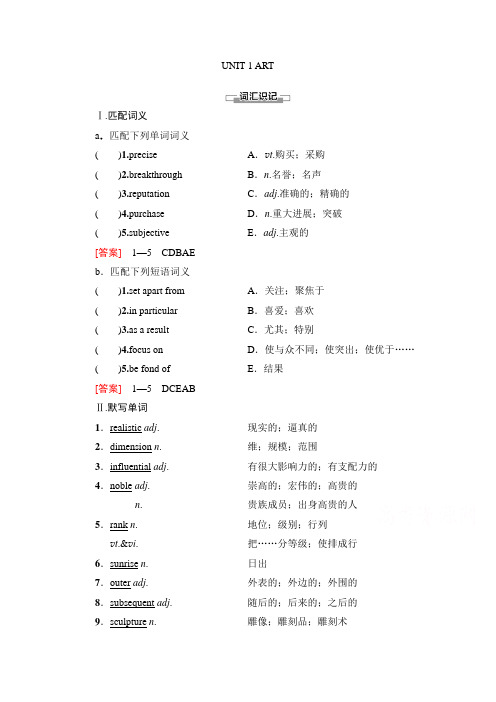
UNIT 1 ARTⅠ.匹配词义a.匹配下列单词词义()1.precise A.v t.购买;采购()2.breakthrough B.n.名誉;名声()3.reputation C.adj.准确的;精确的()4.purchase D.n.重大进展;突破()5.subjective E.adj.主观的[答案]1—5CDBAEb.匹配下列短语词义()1.set apart from A.关注;聚焦于()2.in particular B.喜爱;喜欢()3.as a result C.尤其;特别()4.focus on D.使与众不同;使突出;使优于……()5.be fond of E.结果[答案]1—5DCEABⅡ.默写单词1.realistic adj.现实的;逼真的2.dimension n. 维;规模;范围3.influential adj. 有很大影响力的;有支配力的4.noble adj. 崇高的;宏伟的;高贵的n. 贵族成员;出身高贵的人5.rank n. 地位;级别;行列v t.&v i. 把……分等级;使排成行6.sunrise n. 日出7.outer adj. 外表的;外边的;外围的8.subsequent adj. 随后的;后来的;之后的9.sculpture n. 雕像;雕刻品;雕刻术10.visual adj. 视觉的;视力的Ⅰ.选词填空precise;subsequent;subjective;primitive;convey;breakthrough;mythology;purchase;reputation;photography1.Everyone's opinion is bound to be subjective.2.His tone conveyed his real feelings more truly than his words.3.In Greek mythology,Zeus was the ruler of Gods and men.4.If you are not satisfied with your purchase we will give you a full refund.5.She soon acquired a reputation as a first-class cook.6.Scientists have made a breakthrough in their treatment of that disease.7.Can you give a more precise definition of the word?8.Primitive man hunted wild animals with crude stone implements.9.Developments on this issue will be dealt with in a subsequent report.10.Did you see the film about Antarctica? The photography was superb!Ⅱ.语法填空之派生词1.It is not realistic(realism) to expect people to spend so much money.2.Religious values can often differ greatly from humanistic(humanity) morals.3.She is one of the most influential(influence) figures in local politics.4.The emergence(emerge) of the new idea encouraged us.5.Exploring outer(out) space is a challenge to mankind.6.He studied sculpture(sculptor) because he enjoyed working with clay.1.As there have been so many different styles of Western art,it is impossible to describe them all in a short text.由于西方艺术的风格千差万别,不可能用一个简短的文稿来描述它们。
高一人教版英语必修三unit1学生优秀学案
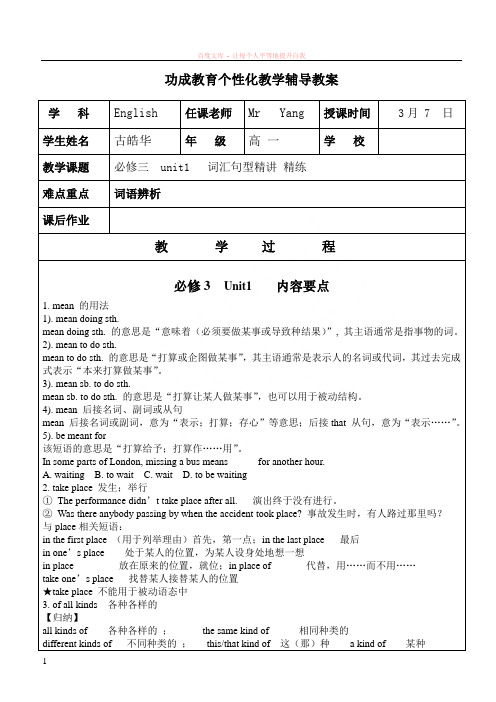
功成教育个性化教学辅导教案学科English 任课老师Mr Yang 授课时间 3月 7 日学生姓名古皓华年级高一学校教学课题必修三 unit1 词汇句型精讲精练难点重点词语辨析课后作业教学过程必修3 Unit1 内容要点1. mean 的用法1). mean doing sth.mean doing sth. 的意思是“意味着(必须要做某事或导致种结果)”, 其主语通常是指事物的词。
2). mean to do sth.mean to do sth. 的意思是“打算或企图做某事”,其主语通常是表示人的名词或代词,其过去完成式表示“本来打算做某事”。
3). mean sb. to do sth.mean sb. to do sth. 的意思是“打算让某人做某事”,也可以用于被动结构。
4). mean 后接名词、副词或从句mean 后接名词或副词,意为“表示;打算;存心”等意思;后接that 从句,意为“表示……”。
5). be meant for该短语的意思是“打算给予;打算作……用”。
In some parts of London, missing a bus means _____ for another hour.A. waitingB. to waitC. waitD. to be waiting2. take place 发生;举行①The performance didn’t take place after all. 演出终于没有进行。
②Was there anybody passing by when the accident took place? 事故发生时,有人路过那里吗?与place相关短语:in the first place (用于列举理由)首先,第一点;in the last place 最后in one’s place 处于某人的位置,为某人设身处地想一想in place 放在原来的位置,就位;in place of 代替,用……而不用……take one’s place 找替某人接替某人的位置★take place 不能用于被动语态中3. of all kinds 各种各样的【归纳】all kinds of 各种各样的;the same kind of 相同种类的different kinds of 不同种类的;this/that kind of 这(那)种 a kind of 某种①That kind of question is very difficult to answer.= Questions of that kind are difficult to answer.②We sell all kinds of shoes.= We sell shoes of all kinds.③You can see different kinds of animals in the zoo.= You can see animals of different kinds in the zoo. 你在动物园可以看见不同种类的动物。
人教版高中英语必修3 Unit1 Reading 优秀学案
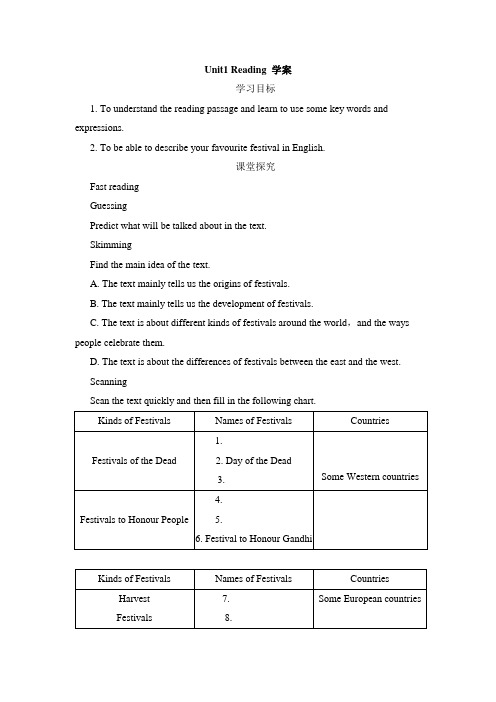
Unit1 Reading 学案学习目标1. To understand the reading passage and learn to use some key words and expressions.2. To be able to describe your favourite festival in English.课堂探究Fast readingGuessingPredict what will be talked about in the text.SkimmingFind the main idea of the text.A. The text mainly tells us the origins of festivals.B. The text mainly tells us the development of festivals.C. The text is about different kinds of festivals around the world,and the ways people celebrate them.D. The text is about the differences of festivals between the east and the west.ScanningScan the text quickly and then fill in the following chart.Intensive ReadingTask 1 Divide the text into 3 parts and find the main idea of each part.Part 1. (Para. 1) _______Part 2. (Para. 2-5) ______Part 3. (Para. 6) _______A. Different kinds of festivals around the world.B. The reason why people celebrate the festivals.C. The origins of the festivals.Task 2 Read Part 1. (Para. l)and do the following exercises.1. What did most ancient festivals celebrate?A. Seasons.B. Religion.C. Special people.D. Special events.2. Choose a sentence to replace the following sentence.In cold winter,people would die because of having no food to eat._____________________________________________Task 3 Read Part 2. (Para. 2-5)and do the following exercises.1. What are festivals of the dead usually for?____________________________________2. What makes autumn festivals happy events?_____________________________________3. What do people usually do at the Spring Festival in China?_________________________________________Task 4 Learn to analyze the following important sentences and translate them.1. Some festivals are held to honour the dead or to satisfy the ancestors, who might return either to help or to do harm.2. The country, covered with cherry tree flowers, looks as though it is covered with pink snow.。
- 1、下载文档前请自行甄别文档内容的完整性,平台不提供额外的编辑、内容补充、找答案等附加服务。
- 2、"仅部分预览"的文档,不可在线预览部分如存在完整性等问题,可反馈申请退款(可完整预览的文档不适用该条件!)。
- 3、如文档侵犯您的权益,请联系客服反馈,我们会尽快为您处理(人工客服工作时间:9:00-18:30)。
B3U1 Festivals Around the World复习学案
Words and Sentences
1.religious (adj.)---religion (n.)
2.independent (adj.)---independence (n.)
3.arrive (v.) ---arrival (n.)
4.celebration (n.)---celebrate (v.)
5.energetic (adj.) ---energy (n.)
6.obvious ( adj.)---obviously (adv.)
7.sad (adj.)---sadness (n.) 8.apologize (v.) ---apology (n.)
9.permit (v.)---permitted---permitted---permission (n.) 10.forgive---forgave---forgiven
11. People should go to clean graves and light incense in memory of their ancestors.
人们要扫墓、烧香,以缅怀祖先。
12. If the neghbours do not give any sweets, the children might play a trick on them.
如果邻居不给孩子们糖果,他们就可能会搞恶作剧。
13. The most energetic and important festivals are the ones that look forward to the end of winter and
the coming of spring. 最富有生气而又最重要的节日,就是告别冬天、迎来春天的日子。
14. The country, covered with cherry tree flowers, looks as though it is covered with pink snow.
整个国度到处是盛开的樱花,看上去就像是覆盖了一层粉红色的雪。
用所给词的正确形式填空或填入适当的介词、连词、情态动词。
1. You mustn’t tell jokes about his __________ belief.(religion)
2. You can’t enter the building without _______________.(permit)
3. You should make an _____________ to John for losing his book.(apologize)
4. Without food, the dog was starved ___________ death.
5. I was expecting Peter at ten, but he didn’t turn ________.
6. India gained independence ___________ Britain in 194
7.
7. If you want to be on time, you should set _______ for the train station at once.
8. Could you please explain the origin ________ the universe.
9. This book reminds me _______ my childhood.
10. He ________ be at home. I saw him in the classroom just now.
11. You _______ go out with your friends but you _______ come back before 10 at night.
(你可以跟朋友出去,但你必须在晚上10点前回来。
)
完成句子
12. Drinking and smoking will be harmful to your health.(同义句转换)
Drinking and smoking will ________ ________ ________ your health.
13. He made an apology to his teacher for being late.(同上)
He ___________ ___________ his teacher for being late.
14. Peter reminded me that I should water the flowers.(同上)
Peter ___________ ____________ ___________ _____________ the flowers.
15. In India there is a national festival on October 2 to honour the great leader, Gandhi.(同上)
In India there is a national festival on October 2 ______ ________ ______ the great leader, Gandhi.
16. _______ _______ _________ _________ we should protect the environment.(显然)
17. Great changes _______ ________ ________ in our school in recent years.(发生)
18. The race was so close that all of us were ________ ________ ________.(屏住呼吸)
翻译
19. 你看起来很累,你肯定整天都在工作。
(情态动词+have done, day and night)
20. 我们正期待着汤姆的到来。
(look forward to)。
